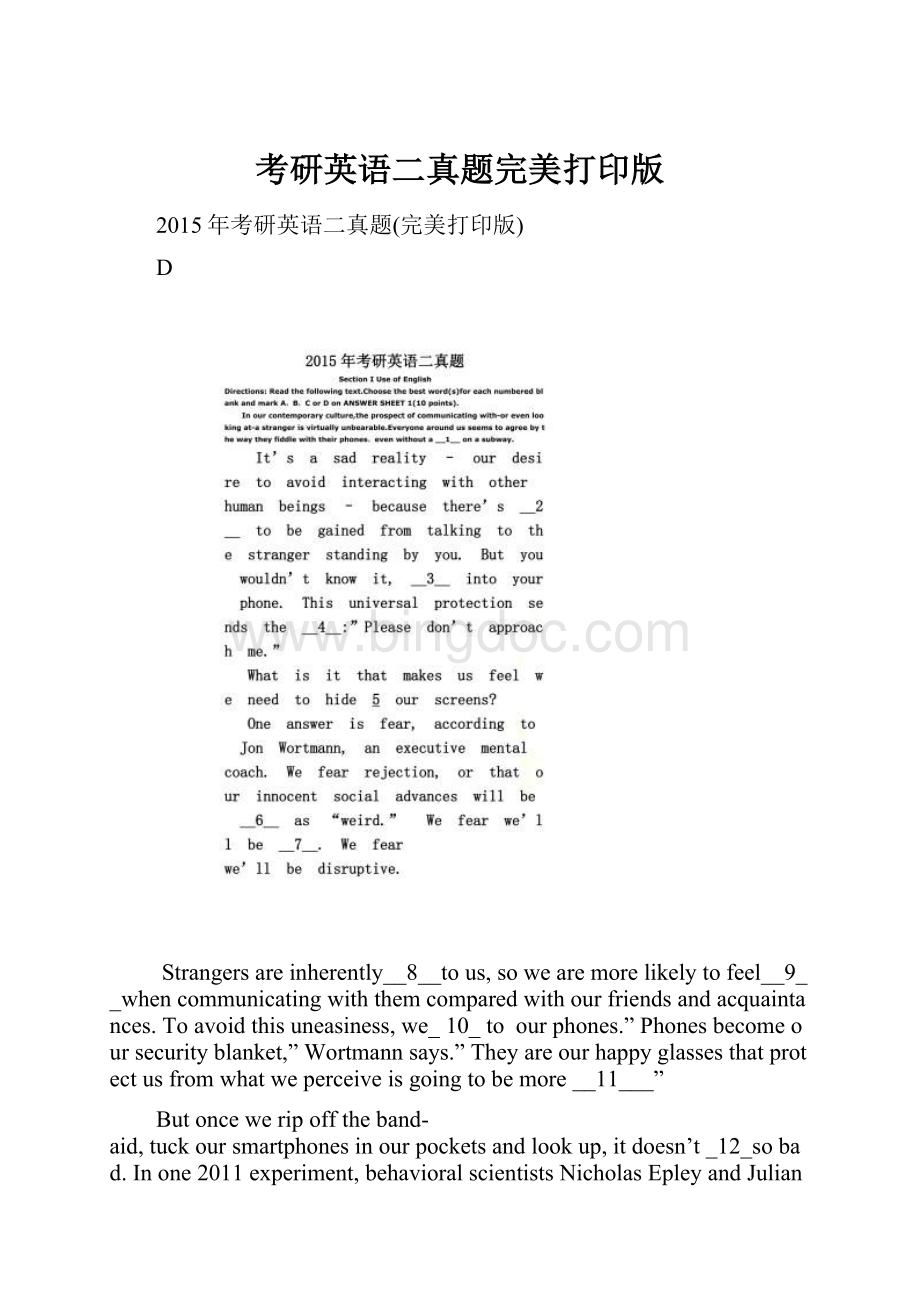考研英语二真题完美打印版.docx
《考研英语二真题完美打印版.docx》由会员分享,可在线阅读,更多相关《考研英语二真题完美打印版.docx(13页珍藏版)》请在冰点文库上搜索。

考研英语二真题完美打印版
2015年考研英语二真题(完美打印版)
D
Strangers are inherently__8__to us, so we are more likely to feel__9__when communicating with them compared with our friends and acquaintances. To avoid this uneasiness, we_ 10_ to our phones.” Phones become our security blanket,” Wortmann says.” They are our happy glasses that protect us from what we perceive is going to be more __11___”
But once we rip off the band-aid, tuck our smartphones in our pockets and look up, it doesn’t _12_so bad. In one 2011 experiment, behavioral scientists Nicholas Epley and Juliana Schroeder asked commuters to do the unthinkable:
Start a _13_. They had Chicago train commuters talk totheir fellow _14_.”When Dr. Epley and Ms.Schroeder asked other people in the same train station to_15_how they would feel after talking to a stranger, the commuters thought their _16_ would be more pleasant if they sat on their own,” The New York Times summarizes. Though the participants didn’t expect a positive experience, after they __17__with the experiment,” not a single person reported having been embarrassed”.
___18____, these commutes were reportedly more enjoyable compared with those without communication, whichmakes absolute sense, _19_human beings thrive off of social connections. It’s that ___20___:
Talking to strangers can make you feel connected.
1. [A]signal [B]permit [C]ticket [D]record 2. [A]nothing [B]little [C]another [D]much
3. [A]beaten [B]guided [C]plugged [D]brought 4. [A]sign [B]code [C]notice [D]message
5. [A]under [B]behind [C]beyond [D]from
6. [A]misapplied [B]mismatched [C]misadjusted [D]misinterpreted
7. [A]replaced [B]fired [C]judged [D]delayed
8. [A]unreasonable [B]ungrateful [C]unconventional [D]unfamiliar
9. [A]comfortable [B]confident [C]anxious [D]angry 10. [A]attend [B]point [C]take [D]turn
11. [A]dangerous [B]mysterious [C]violent [D]boring 12. [A]hurt [B]resist [C]bend [D]decay
13. [A]lecture [B]conversation [C]debate [D]negotiation
14. [A]passengers [B]employees [C]researchers [D]trainees
15. [A]reveal [B]choose [C]predict [D]design 16. [A]voyage [B]ride [C]walk [D]flight
17. [A]went through [B]did away [C]caught up [D]put up
18. [A]In turn [B]In fact [C]In particular [D]In consequence
19. [A]unless [B]since [C]if [D]whereas 20. [A]funny [B]logical [C]simple [D]rare
Section II Reading Comprehension
Part A Directions:
Read the following four texts. Answer the questions after each text by choosing A, B, C or D. Mark your answers on the ANSWER SHEET. (40 points)
Text1
A new study suggests that contrary to most surveys, people are actually more stressed at home that at work. Researchers measured people's cortisol, which is a stress marker, while they were at word and while they were at home and found it higher at what is supposed to be a place of refuge.
Further contradicting conventional wisdom, we found that women as well as men have lower levels of stress at work than at home,writes one of the researchers,Sarah Damaske. In fact women say they feel better at work. She notes. it is men not women. Who report being bappicr at home than at work, Another surprise is that the findings hold true for both those with childrcn and without, but more so for nonparents. This is why pcoplc who work outside the home have better health.
What the study doesnt measure is whether people are still doing work when they're at home, whether it is household work or work brought home from the office. For many men, the end of the workday is a time to kick back. For women who stay home, they never get to leave the office. And for women who work outside the home, they often are playing catch-up-with-household tasks. With the blurring of roles, and the fact that the home front lags well behind the workplace in making adjustments for working women, it's not surprising that women are more stressed at home.
But it's not just a gender thing. At work, people pretty much know what they're supposed to be doing to be doing:
wording, making money, doing the tasks they have to do in order to draw an income. The bargain is very pure:
Employee puts in hours of physical or mental labor and employee draws out life-sustaining moola.
On the home front, however, people have no such clarity. Rare is the household in which the division of labor is so clinically and methodically laid out. There are a lot of tasks to be done, there are inadequate rewards for most of them. Your home colleagues--your family-have no clear rewards for their labor; they need to be talked into is, of if they're teenagers, threatened with complete removal of all electronic devices. Plus, they’re teenagers, threatened with complete removal of all electronic devices. Plus, they're your family. You cannot fire your family. You never really get to go home from home.
So it's not surprising that people are more stressed at home. Not only are the tasks apparently infinite, the co-workers are much harder to motivate.
21.According to Pa ragraph 1most previous su rveys found that home
[A]was an un realistic place for relaxation
[B]generated more stress than the workplace
[C]was an ideal place for stress measurement
[D]offered greater relaxation than the workplace
22.According to Damaske, who are likely to be the happiest at home?
[A]Working mothers [B]Childless husbands [C] Childless wives [D]Working fathers
23.The blurring of working womens roles refers to the fact that
[A]they are both bread winners and housewives
[B]their home is also a place for kicking back
[C]there is often much housework left behind
[D]it is difficult for them to leave their office
24.The wordmoola(Line 4, 4)most probably means
[A]energy [B]skills [C]earnings [D]nutrition
25.The home front differs from the workplace in that
[A]home is hardly a cozier working environment
[B]division of labor at home is seldom clear-cut
[C]household tasks are generally more motivating
[D]family labor is often adequately rewarded
Text 2
Foryears,studieshavefoundthatfirst-generationcollegestudents-thosewhodonothaveaparentwithacollegedegree-lagotherstudentsonarangeofeducationachievementfactors.Theirgradesarelowerandtheirdropoutratesarehigher.Butsincesuchstudentsaremostlikelytoadvanceeconomicallyiftheysucceedinhighereducation,collegesanduniversitieshavepushedfordecadestorecruitmoreofthem.Thishascreatedadoxinthatrecruitingfirst-generationstudents,butthenwatchingmanyofthemfail,meansthathighereducationhascontinuedtoreproduceandwiden,ratherthancloseachievementgapbasedonsocialclass,accordingtothedepressingbeginningofapaperforthcominginthejournalPsychologicalSciense.
Butthearticleisactuallyquiteoptimistic,asitoutlinesapotentialsolutiontothisproblem,suggestingthatanapproach(whichinvolvesaone-hour,next-to-no-costprogram)canclose63percentoftheachievementgap(measuredbysuchfactorsasgrades)betweenfirst-generationandotherstudents.
Theauthorsofthepaperarefromdifferentuniversities,andtheirfindingsarebasedonastudyinvolving147students(whocompletedtheproject)atanunnamedprivateuniversity.Firstgenerationwasdefinedasnothavingaparentwithafour-yearcollegedegree.Mostofthefirst-generationstudents(59.1percent)wererecipientsofPellGrants,afederalgrantforundergraduateswithfinancialneed,whilethiswastrueonlyfor8.6percentofthestudentswithatleastoneparentwithafour-yeardegree.
Theirthesis-thatarelativelymodestinterventioncouldhaveabigimpact-wasbasedontheviewthatfirst-generationstudentsmaybemostlackingnotinpotentialbutinpracticalknowledgeabouthowtodealwiththeissuesthatfacemostcollegestudents.Theycitepastresearchbyseveralauthorstoshowthatthisisthegapthatmustbenarrowedtoclosetheachievementgap.
Manyfirst-generationstudents"struggletonavigatethemiddle-classcultureofhighereducation,learnthe'rulesofthegame,'andtakeadvantageofcollegesresources,”theywrite,Andthisbecomesmoreofaproblemwhencollegesdon'ttalkabouttheclassadvantagesanddisadvantagesofdifferentgroupsofstudents."BecauseUScollegesanduniversitiesseldomacknowledgehowsocialclasscanaffectstudents'educationalexperiences,manyfirst-generationstudentslackinsightaboutwhytheyarestrugglinganddonotunderstandhowstudents"likethem'canimprove."
26.Recruitingmorefirst-generationstudentshas.
[A]reducedtheirdropoutrates[B]narrowedtheachievementgap
[C]depressedcollegestudents[D]misseditsoriginalpurpose
27.Theauthorsoftheresearcharticleareoptimisticbecause.
[A]theirfindingsappealtostudents[B]therecruitingratehasincreased
[C]theproblemissolvable[D]theirapproachiscostless
28.Thestudysuggeststhatmostfirst-generationstudents.
[A]studyatprivateuniversities[B]arefromsingle-parentfamilies
[C]areinneedoffinancialsupport[D]havefailedtheircollege
29.Theauthorsofthepaperbelievethatfirst-generationstudents.
[A]areactuallyindifferenttotheachievementgap
[B]canhaveapotentialinfluenceonotherstudents
[C]maylackopportunitiestoapplyforresearchprojects
[D]areinexperiencedinhandlingtheirissuesatcollege
30.Wemayinferfromthelastparagraphthat.
[A]universitiesoftenrejectthecultureofthemiddle-class
[B]collegesarepartlyresponsiblefortheprobleminquestion
[C]socialclassgreatlyhelpsenricheducationalexperiences
[D]studentsareusuallytoblamefortheirlackofresources
Text3
Evenintraditionaloffices,“thelinguafrancaofcorporateAmericahasgottenmuchmoreemotionalandmuchmoreright-brainedthanitwas20yearsago,”saidHarvardBusinessSchoolprof